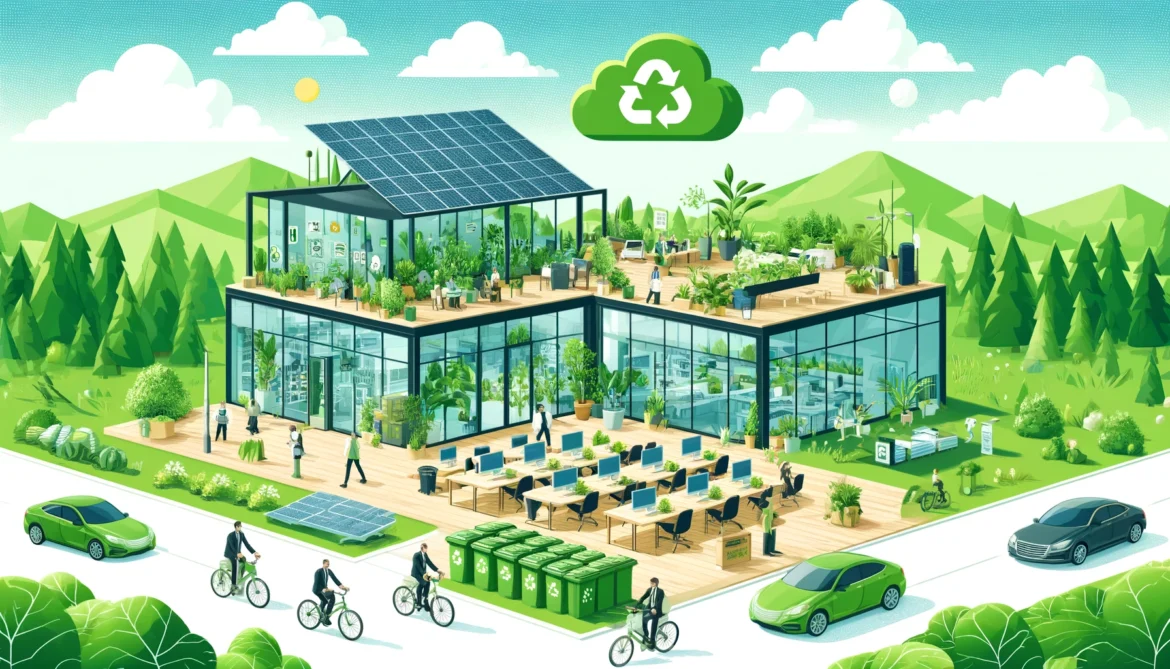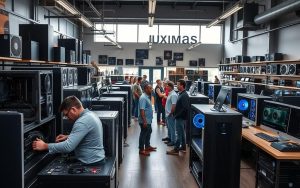Table of Contents
When environmental concerns are at the forefront of societal consciousness, businesses must adapt to sustainable practices to reduce their ecological footprint. From reducing waste to embracing renewable energy sources, companies increasingly incorporate eco-friendly initiatives into their operations.
This article explores various strategies that modern businesses can adopt to promote sustainability, focusing on using eco-friendly building materials, such as prefab steel building kits.
Reducing Waste:
One of the key goals of sustainable business practices is to minimize waste generation. This is achieved through recycling, composting, and reducing single-use plastics. Businesses can significantly decrease their environmental impact by implementing recycling programs and encouraging employees to minimize paper usage. Investing in reusable packaging and containers can further reduce waste in production and distribution processes.
Energy Efficiency:
Energy consumption is a prime contributor to greenhouse gas emissions and environmental degradation. Businesses can mitigate their energy usage by adopting energy-efficient technologies and practices. This includes upgrading to LED lighting, installing programmable thermostats, and optimizing heating, ventilation, and air conditioning (HVAC) systems.
Sustainable Transportation:
Transportation is another area where businesses can make a substantial impact on sustainability. Encouraging employees to carpool, use public transportation, or commute by bicycle can reduce carbon emissions associated with daily travel. Additionally, companies can invest in electric or hybrid vehicles for their fleets, further reducing their environmental footprint.
Eco-Friendly Building Materials:
The construction industry significantly contributes to environmental degradation due to its reliance on resource-intensive materials and processes. However, businesses can promote sustainability by choosing eco-friendly building materials for their facilities. Prefabricated steel building kits are an excellent example of such materials, offering numerous environmental benefits.
Prefab Building Kits:
Prefab building kits, offered by companies like Norsteel Buildings, are revolutionizing the construction industry with their environmentally friendly features. These kits are constructed using recycled steel, reducing the demand for raw materials and diverting waste from landfills. Steel is also highly durable, providing long-lasting structures requiring minimal maintenance over their lifespan. Furthermore, prefab steel buildings can be designed to maximize energy efficiency, with options for insulation and natural lighting, further reducing energy consumption.
Promoting Sustainable Supply Chains:
Businesses can also promote sustainability by evaluating and optimizing their supply chains. This involves working with suppliers prioritizing eco-friendly practices like utilizing renewable energy in manufacturing processes and reducing packaging waste. Implementing supply chain transparency initiatives can also help identify areas for improvement and ensure products are sourced ethically and sustainably. By partnering with like-minded suppliers, businesses can collectively reduce the environmental footprint and promote sustainability throughout production.
Employee Engagement and Education:
Engaging employees in sustainability initiatives is imperative for developing environmental responsibility within the organization. Businesses can offer education programs to build awareness about the necessity of sustainability and empower employees to implement eco-friendly practices in their work routines. Additionally, creating incentives for eco-friendly behaviors, such as rewards for carpooling or recycling initiatives, can encourage active participation and drive meaningful change. By harnessing the collective efforts of employees, businesses can amplify the impact and create a sustainable future for the company and the planet.
Advanced Recycling Systems
Businesses can create more sustainable production cycles by investing in chemical recycling technologies. This process not only recycles materials but also converts waste back into virgin-quality raw materials, which can be reused in manufacturing. This technology supports a true circular economy by significantly reducing the reliance on new raw materials and decreasing landfill waste.
Enhanced Energy Management Systems
Deploying advanced IoT-enabled energy management systems can greatly increase energy efficiency. These systems can learn and predict optimal energy usage patterns and make real-time adjustments. For example, smart thermostats and lighting systems that adjust based on real-time data can drastically reduce unnecessary energy consumption, especially in large office buildings or manufacturing facilities.
Green Logistics and Supply Chain Optimization
Implementing electric or hydrogen-fueled vehicles for transport and distribution can drastically cut emissions. Additionally, utilizing software to optimize delivery routes and consolidate shipments can reduce the number of trips required, further decreasing the environmental impact.
Biodegradable and Eco-friendly Materials
Expanding the use of biodegradable materials can transform product lifecycles. For instance, substituting traditional plastics with polylactic acid (PLA), a biodegradable material made from corn starch, in product packaging can help in achieving sustainability goals. These materials decompose naturally, causing minimal environmental impact when discarded.
Sustainability Certifications and Standards Compliance
Gaining certifications such as ISO 50001 for energy management can demonstrate a company’s commitment to efficient energy use. This not only helps in aligning with global sustainability standards but also reassures customers and stakeholders of the company’s dedication to responsible energy consumption practices.
These detailed strategies are aimed at fostering a deeper integration of sustainability into core business practices, ultimately leading to long-term benefits both environmentally and economically.









